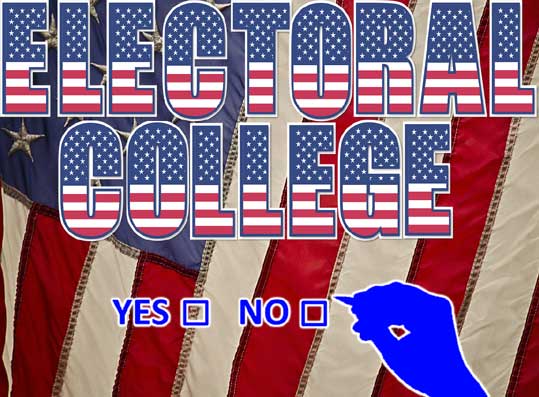News

 Via Breitbart:
Via Breitbart:
Colorado has become the 12th state to pass a measure changing the way it awards its Electoral College votes in presidential elections to award the electoral votes to the winner of the popular vote in presidential elections should enough states sign on.
Democrat Gov. Jared Polis signed a bill on Friday that would award Colorado’s presidential electoral votes to the candidate who wins the popular vote in a presidential election, allowing the state to join the National Popular Vote Interstate Compact.
It technically does not eliminate the Electoral College, it just awards the electoral votes from the states that sign onto the compact to the winner of the national popular vote. The compact only kicks in if enough states amounting to 270 electoral votes–a White House win–sign onto the plan.
Via Wikipedia:
The National Popular Vote Interstate Compact (NPVIC) is an agreement among a group of U.S. states and the District of Columbia to award all their electoral votes to whichever presidential candidate wins the overall popular vote in the 50 states and the District of Columbia. The compact is designed to ensure that the candidate who receives the most votes nationwide is elected president, and it would come into effect only when it would guarantee that outcome.[2][3] As of March 2019, it has been adopted by twelve states and the District of Columbia. Together, they have 181 electoral votes, which is 33.6% of the Electoral College and 67.0% of the 270 votes needed to give the compact legal force.
Proposed in the form of an interstate compact, the agreement would go into effect among the participating states in the compact only after they collectively represent an absolute majority of votes (currently at least 270) in the Electoral College. In the next presidential election after adoption by the requisite number of states, the participating states would award all of their electoral votes to the candidate with the largest national popular vote total in the 50 states and the District of Columbia. As a result, that candidate would win the presidency by securing a majority of votes in the Electoral College. Until the compact's conditions are met, all states award electoral votes in their current manner.
The compact would modify the way participating states implement Article II, Section 1, Clause 2 of the U.S. Constitution, which requires each state legislature to define a method to appoint its electors to vote in the Electoral College. The Constitution does not mandate any particular legislative scheme for selecting electors, and instead vests state legislatures with the exclusive power to choose how to allocate their states' electors (although systems that violate the 14th Amendment, which mandates equal protection of law and prohibits racial discrimination, would be prohibited).[3][4] States have chosen various methods of allocation over the years, with regular changes in the nation's early decades. Today, all but two states (Maine and Nebraska) award all their electoral votes to the candidate with the most votes statewide (the "winner-take-all" system). ...
The project has been supported by editorials in newspapers, including The New York Times,[12] the Chicago Sun-Times, the Los Angeles Times,[17] The Boston Globe,[18] and the Minneapolis Star Tribune,[19] arguing that the existing system discourages voter turnout and leaves emphasis on only a few states and a few issues, while a popular election would equalize voting power. Others have argued against it, including the Honolulu Star-Bulletin.[20] An article by Pete du Pont, a former Governor of Delaware, in the opinion section of The Wall Street Journal[21] has called the project an urban power grab that would shift politics entirely to urban issues in high population states and allow lower caliber candidates to run.